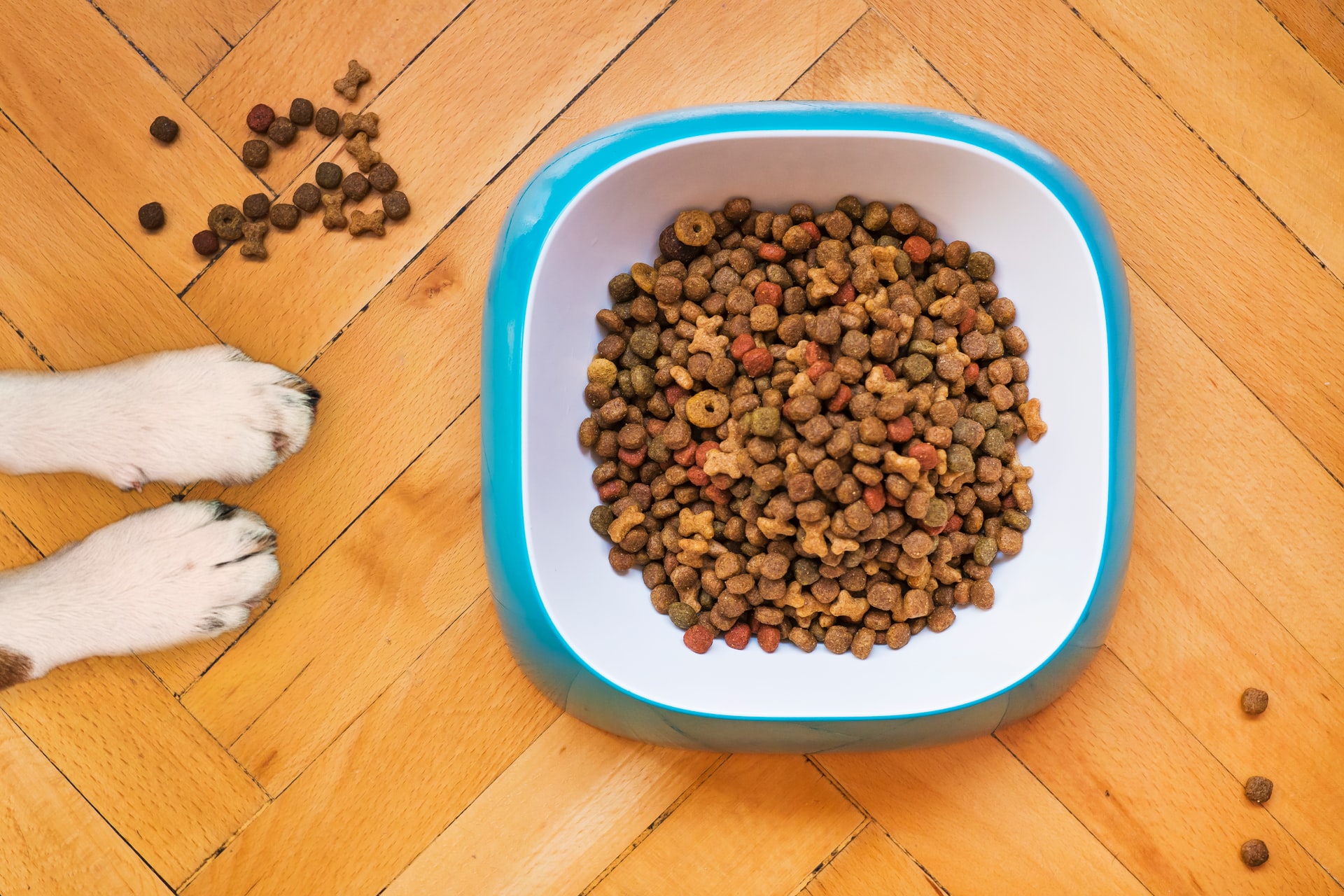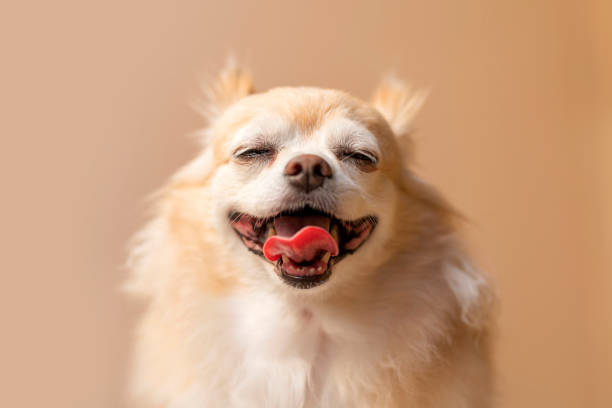Alopecia is the medical word for hair loss in Chihuahua. It is both prevalent and obvious. Hair loss can happen in a single location, in patches, or over the body. If your Chihuahua is losing hair at home, you may be wondering why and whether you should seek Chihuahua hair loss therapy. There are several factors that might cause a Chihuahua to lose hair, but your pup is most likely bald due to one of five frequent causes.
One of the most prevalent fur problems with this breed is hair loss that cannot be explained by natural shedding. This can occur at any age and for a number of causes.
Causes of Chihuahua Hair Loss
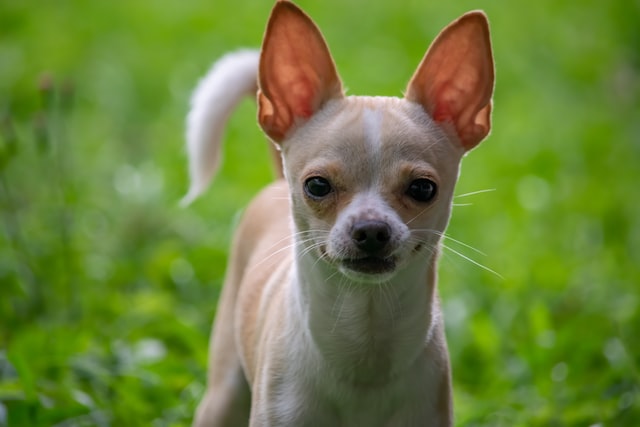
⚪ Allergies
Itchy skin and hair loss are two of the most obvious signs that your Chihuahua is allergic. They may be allergic to particular dietary components or environmental elements such as pollen or dust mites. Your veterinarian can do tests to see whether your Chihuahua has food or environmental allergies.
⚪ Parasites
The most prevalent skin illness in dogs is flea allergic dermatitis, often known as flea bite hypersensitivity. Even if your Chihuahua is not allergic to fleas, these parasites can irritate their skin and cause hair loss through scratching, rubbing, or biting.
Hair loss in Chihuahuas can also be caused by mites and lice. The lice found on Chihuahuas are not the same species as those found on people, and they spread through diseased canines, overcrowded living, contaminated grooming instruments, and inadequate hygiene. Beyond hair loss, signs of lice on Chihuahuas include irritation, redness, and dry skin and coat.
⚪ Skin Conditions or Infections
Chihuahuas, like people, can get dry, cracked skin or skin diseases. These disorders can make your pet’s skin very itchy. Chihuahuas may frequently lick, scratch, or itch themselves to relieve discomfort, which can result in hair loss over time.
Chihuahuas with bacterial or fungal skin diseases frequently have an allergic component. Other animals’ bites, as well as wounds and abrasions, can also cause skin illnesses.
⚪ Post-grooming Alopecia
If your Chihuahua has a dense coat, trimming or shaving it may cause it to grow back in areas. It’s a disorder known as post-grooming alopecia.
This can also happen if you shave a portion of your Chihuahua’s coat for medical treatment. It may take some time, but the hair will ultimately grow back to its regular length and consistency.
⚪ Hypothyroidism
Hypothyroidism happens when the thyroid gland in your Chihuahua becomes irritated or shrinks. As a result, the thyroid does not operate properly. Hair loss caused by hypothyroidism can occur anywhere on the body and normally does not cause itching or skin irritation.
This is most common in middle-aged medium to big breeds and can be detected with a blood test done by a veterinarian.
⚪ Pressure Sores
Pressure sores are more common in older or less mobile Chihuahuas, which are produced by the pressure of resting in one area for a lengthy period of time.
These sores typically appear on a Chihuahua’s hip, elbows, or sides and can develop into a chronic ailment, similar to bedsores in people. And because pressure sores can be difficult to treat, prevention is essential. Keep your Chihuahua mobility, and if required, consider purchasing them a wheelchair.
Also, make sure they have clean, soft, comfy bedding at all times. If you discover pressure sores anywhere on your Chihuahua’s body, take them to the clinic right away.
Carefully Grooming your Chihuahua
🟢 First Step
Brush your Chihuahua’s fur. Chihuahuas can have soft or lengthy coats. The silky, lustrous coat holds firm to the body of a Chihuahua. Long coats are flat to somewhat curled, with leg feathering and a plumed tail. Chihuahuas with either coat style will shed, but it will be little.
Brush your smooth-coated Chihuahua twice a week using a rubber grooming glove or soft-bristled brush. Natural materials should be used for the bristles.
Long-coated Chihuahuas require more regular brushing, at least once a week, but daily is best. Extract dead and loose hair with a fine-toothed flea comb. To remove knotted hair, use a stainless steel comb.
🟢 Second Step
Give your Chihuahua a bath. Brushing regularly will eliminate the need to wash your Chihuahua. Unless they have gotten into anything especially foul, a wash every one to two months is generally good. Only use dog-safe shampoo.
Human shampoo may remove important oils from your Chihuahua’s skin. Warm water should be used to bathe your Chihuahua. Do not allow your Chihuahua to air dry after washing them. And because of their tiny stature, Chihuahuas can quickly lose body heat and get chilled. After a bath, use a towel to quickly and correctly dry your Chihuahua.
🟢 Third Step
Your Chihuahua’s eyes should be cleaned. The eyes of your Chihuahua may occasionally have discharge wrapping them.
To eradicate the discharge, gently wash the area around her eyes with a soft towel. Tear streaks around the eyes of individual Chihuahuas are also standard. Tear stain removers may be found at your local pet store.
🟢 Fourth Step
Your Chihuahua’s ears should be cleaned. Chihuahua ears are prone to be soiled. To clean your Chihuahua’s ears, dab a cotton ball with a tiny quantity of dog-specific ear cleaning products. Wipe their ears gently with the cotton ball. But not so deeply that you can’t see the cotton ball clean only as deep as your first knuckle.
If their ears smell or if you can see wax, clean them. Using a cotton swab to clean your Chihuahua’s ears may drive wax, dirt, and other particles further into their ears. If your Chihuahua’s ears appear dry, dab a little quantity of baby or coconut oil over the margins.
🟢 Fifth Step
Your Chihuahua’s nails should be trimmed. Chihuahua nails develop quite rapidly. As a result, it is important to periodically cut your Chihuahua’s nails.
Trimming their nails once every few weeks should be sufficient to keep them from becoming too long and clicking on the floor. If you are hesitant to clip your Chihuahua’s nails yourself, try taking them to a groomer or your veterinarian.
🟢 Sixth Step
Brush the teeth of your Chihuahua. Small dogs, such as Chihuahuas, are prone to dental issues. Routine dental treatment is thus required to maintain dental health.
Brush your Chihuahua’s teeth at least once a week if feasible. Brushing your Chihuahua’s teeth should begin when they are puppies to ensure that they are familiar with the activity. An older Chihuahua is likely to be more averse to having its teeth cleaned.
Use only a toothbrush and toothpaste designed for dogs. If you are unsure about brushing your Chihuahua’s teeth, your veterinarian can do it for you. A veterinarian’s dental cleaning, on the other hand, necessitates anesthesia for your Chihuahua and can consequently be rather costly.
Your Chihuahua’s tiny mouth does not qualify for good tooth development. Your veterinarian may need to extract multiple teeth to provide room for the remaining teeth to mature properly.
🟢 Seventh Step
Examine your Chihuahua’s body. Grooming is an excellent opportunity to examine your Chihuahua’s physique for any abnormalities.
Schedule an arrangement with your veterinarian for a comprehensive physical examination and medical workup if you observe any irregularities. Checking your Chihuahua’s physique regularly will help you spot issues early, when they may be readily remedied.
Maintaining the Safety and Health of your Chihuahua
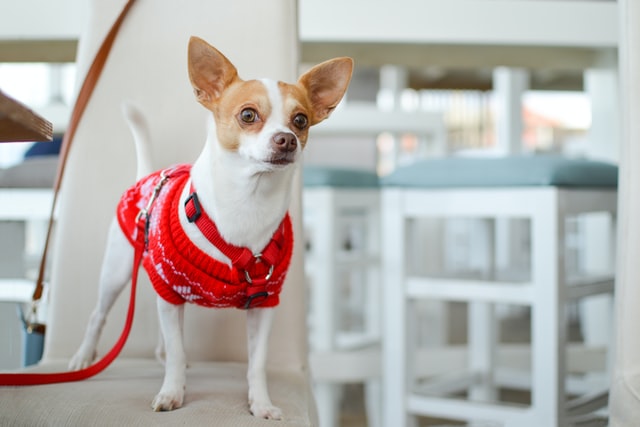
❶
Make your home puppy-proof. Chihuahua pups are inherently interested, yet they may be destructive and get into mischief because they like playing with their lips. You must safeguard any dangerous things in your house to keep them safe. Keep dangerous goods such as medication, cleaning supplies, and chemicals locked away.
Pick up any stray things on the floor, particularly if they are breakable or delicate. Purchase baby or puppy gates to limit your dog to some areas of your home. Keeping your puppy in a room with easy-to-clean surfaces, like tile or hardwood, will be beneficial during housetraining.
❷
You should register your pet. In order to get identity tags and a dog license in many states and cities, you must first register your dog with the municipal administration.
Registration may be subject to a minor cost. Inspect your local government to see whether there is a fee and how much it costs. Attach your puppy’s new identification tags to their collar as soon as you get them.
❸
Consult with your veterinarian. Whether you bought your new Chihuahua from a breeder or adopted them from a shelter, you will need to take them to the veterinarian for vaccines. You should also microchip your dog and spay or neuter it.
Depending on where you reside, your veterinarian may suggest extra immunizations. Aggression can be reduced by spaying and neutering. This can improve their attention span and reduce their risks of having medical disorders such as prostate problems and uterine infections.
❹
Keep your blood sugar levels in check. Chihuahuas frequently have severe blood sugar issues and must be fed in little quantities throughout the day to maintain their blood sugar from dropping or increasing. Young puppies under the age of four months are the most vulnerable.
Regular meals throughout the day can aid in the prevention of hypoglycemia, or a drop in blood sugar levels. By applying honey to their gums, you can help a dog with dangerously low blood glucose. You should take them to the local veterinarian or pet hospital after they have been stabilized.
❺
Prevent unintentional injury. Chihuahuas, like other petite breeds, are prone to harming themselves by leaping or tumbling off of furniture. While many owners allow their Chihuahuas to sit on the furniture, it is best to keep them on the ground.
They have more delicate bones than larger dogs, putting them at a higher risk of fractures, internal injuries, and concussions. By leaping or overexerting themselves, Chihuahuas are at a significant risk of developing luxating patellas, which is essentially a dislocated kneecap. Keep Chihuahua pups away from tiny children, who can inadvertently harm them.
Feeding your Chihuahua
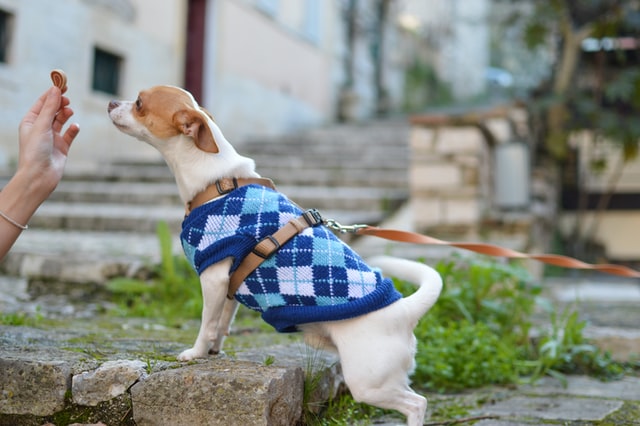
You must feed your Chihuahua the proper diet to keep them healthy. You can prevent them from losing their hair in the future by giving them the proper nourishment.
✔️ Feed them Healthy Food
Chihuahuas, like other puppies, require nutritious meals to be healthy. They do not require a special diet, however, you should see your veterinarian for brand suggestions. Chihuahuas, like other tiny dogs, are susceptible to heart and renal issues if fed a high-salt diet.
To avoid this problem, use a dog food that is low in salt. Chihuahua pups require more protein and calories than adults, so choose a meal that is high in nutrients. Canned puppy food may be simpler to chew for your dog at first, but dry kibble usually delivers more nutrients.
✔️ Have a Schedule
Feed regularly. Chihuahua pups have tiny stomachs yet quick metabolisms. They require repeated feedings throughout the day to maintain their energy, blood sugar levels, and growth.
The number of times they need to eat every day is typically determined by their age. Scheduled feeding is critical during housetraining. And because you may anticipate that your dog will need to relieve themselves approximately 30 minutes after eating.
✔️ Give them Water
Chihuahua puppies can quickly get dehydrated due to their high energy expenditure throughout the day.
Always have fresh clean water ready for them in a small dish that they can reach into but won’t spill over. If water bowls are too difficult for puppies to drink from, they may attempt to climb into them and drown.
✔️ Avoid Toxic Foods
There are several foods that are hazardous to dogs. Because of their small size, even little quantities of these foods can be quite hazardous to Chihuahua puppies. You should also refrain from giving them table leftovers.
Human food is generally high in calories and can lead to weight gain, which is common in Chihuahuas and detrimental to their health. Feeding your puppy table scraps promotes bad habits such as begging and may easily account for one-third of their daily food consumption requirements.
Frequently Asked Questions
Q: What can I feed my Chihuahua to help with hair loss?
A: Apple cider vinegar has antibacterial and antifungal qualities, as well as immune-boosting characteristics. As a result, apple cider vinegar is an excellent home cure for Chihuahuas suffering from hair loss.
Q: Should I be concerned about my Chihuahua’s hair loss?
A: Stress, poor diet, pregnancy, breastfeeding, or any underlying medical issue can all cause excessive shedding. Schedule an appointment with your veterinarian if you believe your Chihuahua is shedding excessively or developing bald spots.
Q: Why is my Chihuahua’s hair falling out on its head?
A: Ringworm fungus, parasites like mange mites, and bacteria can all cause diseases that result in bald areas on your Chihuahua.
Q: What foods promote Chihuahua hair loss?
A: If your veterinarian believes that your Chihuahua’s hair loss is caused by food allergies, remove the offending item from his diet. Wheat, maize, soy, eggs, and even beef or chicken are the most prevalent dietary allergies in Chihuahuas.
Q: Will my Chihuahua’s hair regrow?
A: It might take up to 6 months for her coat to come back completely. This can also be caused by stress. Anesthetics can induce considerable hair loss in both male and female Chihuahuas.
Q: Can Chihuahuas lose their hair due to stress?
A: A stressful situation might cause a Chihuahua to lose hair in some situations. It might be a house move or the departure of a close friend. When the creature is calmer, its fur should come back.
Final Thoughts
Chihuahuas are little canines with enormous personalities who form devoted and protective bonds with their owners. Puppies have a lot of energy and must be exercised daily, socialized with other dogs, and provided nutritional meals to be healthy.
Chihuahuas losing their hair might be a little inconvenience. However, it is not uncommon for anything terrible to occur. That is why it is critical that you understand how to approach it.
Here at ILoveChihuahua, we share our personal experiences as owners of this feisty breed. We talk about recommended methods, dog supplies picks, and advice on common Chihuahua problems. Our goal is to promote responsible dog ownership, so there would be fewer Chihuahuas in shelters.

